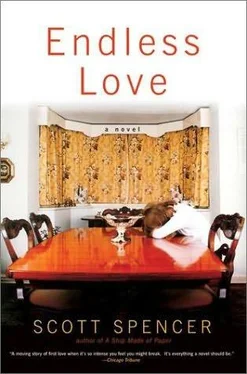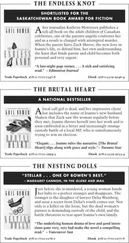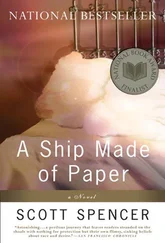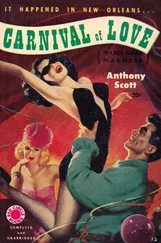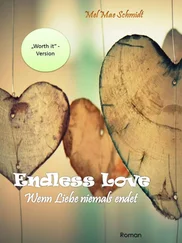So I would not say that the Butterfields were on acid that night and I would not volunteer anecdotes about the far-flung Butterfieldian lifestyle. Ted Bowen, a lawyer very much like my father, with his sturdy amber teeth, peppermint breath, and the one long uninterrupted eyebrow growing from temple to temple, arranged for a private meeting with me. He took me to a working-class cafeteria on 53rd Street and, in a long speech that was both tender and formal, informed me of the consequences of a guilty verdict. He described juvenile detention and the humiliations I might suffer. “These are guys from the bottom of the heap, David. Simple socialist theory will tell you what that does to a person. They have nothing, they believe in nothing, and they’ll kill you for a half of a cigarette.” Then he leaned forward and gave me one of those I-wouldn’t-be-telling-you- this-if-I-didn’t-think-you-could-take-it looks. “I don’t know if you’ve heard about homosexuality.…” And with that his voice trailed off and his eyes looked so sad and so astoundingly serious that out of sheer nervousness I smiled.
When I thought of how I’d set fire to those newspapers on the Butterfields’ porch, it seemed fair (that is, not cowardly, not evasive) to say that I wasn’t in my right mind. And the root of this temporary insanity? Clearly, it was my love for Jade—a love blocked and turned frantic by my banishment from the Butterfields’ house. Love, that is to say love thwarted, severed me from my senses. The fire was not mischief, not hatred, not some crazy act of revenge.
From the time I learned to love Jade and was drawn into the life of the Butterfield house, straight through to the wait for my case to come before the judge, there was nothing in my life that wasn’t alive with meaning, that wasn’t capable of suggesting weird and hidden significances, that didn’t carry with it the undertaste of what for lack of anything better to call it I’ll call The Infinite. If being in love is to be suddenly united with the most unruly, the most outrageously alive part of yourself, this state of piercing consciousness did not subside in me, as I’ve learned it does in others, after a time. If my mind could have made a sound, it would have burst a row of wineglasses. I saw coincidences everywhere; meanings darted and danced like overheated molecules. Everything was terrifyingly complex; everything was terrifyingly simple. Nothing went unnoticed and everything carried with it a kind of drama. This agony, this delight did not recede when Hugh told me it would be best if I kept away from Jade for a month, nor did it quiet down after the fire and the weeks I spent in limbo—not knowing what was going to be done with me and, above all, not being able to see her. But the actual decision by Judge Rogers slipped by the perpetual watchfulness of my overstimulated consciousness. I had no idea that a ruling was near, and the whole affair was suddenly (“I guess we were lucky,” said Rose) decided behind my back—a deal between Ted Bowen, the district attorney, and Rogers.
No prison. No juvenile home. And, if my parents were willing to pay for something private, no state institution. I was judged psychologically irresponsible and assigned to a psychiatric hospital for one year, until my eighteenth birthday, after which my case could be reviewed. It was not even a real conviction; the time in the nuthouse was parole.
My parents’ aversion to psychiatry was so deeply ingrained and so reflexive that they could have just as easily related to my being sent to a seminary. (“Let’s consider ourselves very, very lucky,” my mother said through her tears, but I knew that she would soon be thinking—if she wasn’t already—that as deadly as prison might have been, it would have been something I could hold in common with Stalin, with Eugene Dennis, with the Spanish Freedom Fighters, and thousands of other revolutionary heroes, whereas time in a mental institution would put me in league with some chain-smoking wisecracker, Oscar Levant, say, some pampered little fool in love with his own feelings.) I was, however, relieved at the judge’s decision and felt, by and large, that I’d been treated fairly. I could have imagined a complete excusal—and often I fantasized it, the judge saying, “David didn’t mean to do it,” and leaving it at that—but the prospect frightened me. I thought a measure of punishment would be best, all around, and I was grateful that this punishment would be in a private hospital, with rolling green lawns and adolescent flip-outs from privileged, tolerant homes. The judge had indicated that my assignment to psychiatric care could be reviewed after a year, but I felt that with any luck and one or two sympathetic ears to hear the truth of my feelings, to sense the enormity and stability of my feelings, I would be out in a few months, ready to pick up the thread of my life at the point at which I’d snapped it.
The judge devised his sentence after a parole officer interviewed anyone who might give the court a sense of my character. (“It’s like a cockamamie FBI check-up,” said Arthur. “The FBI,” said Rose, nodding and looking at me with sorrowful intensity—trying to remind me of who I really was.) The parole officer spoke to the psychologists who’d tested me. And he spoke to me. (He was a young man, Japanese, longing to pass for friendly. “Why do you think you set their house on fire, Dave?” he said, in a cagey voice, as if it were the first time anyone had put the question so directly. I stammered out the beginnings of a reply and then lowered my face into my hands and wept—out of habit, partly, because I cried constantly during those weeks, out of helplessness, and, in a peculiar yet undeniable way, out of boredom, because that fire, for all of its horror and devastation, was just a part of my life, a part of my heart’s passionate destiny, and it seemed atrociously unfair that now it was all that was important.)
The parole officer spoke to my teachers at Hyde Park High School, who told him I was a good student. He spoke to my few friends and he spoke to my friends’ parents. I don’t know what he learned—that I liked astronomy, jazz, baseball, that I read books, baked cakes, and liked to turn the volume off the TV and supply absurd, dirty dialogue in a variety of voices. He asked me to give him the names of past girlfriends and he spoke to them and their parents. I doubt very much that Linda Goldman told of relieving me of my virginity in her family’s paneled basement—one of the only paneled basements in Hyde Park. The Goldmans were business people and devoted their basement to pleasure: a wet bar, two couches, a Ping-Pong table, and an octagonal poker table covered in tropical green felt with circular recesses for stacking chips. No, I don’t think Linda breathed a word of our afternoon’s struggle; I don’t even know that she remembered it. All that could have distinguished my turn from all of the other afternoons she’s spent with such tender self- destructiveness was the sound of her father’s voice rolling through the heat ducts, saying, “I could have sworn there was a chicken leg in the refrigerator. I could have sworn it.” As to other friends, including girlfriends, they were a part of the world originating with my parents. Though my father in particular didn’t want me to be a typical “red-diaper baby,” that is to say, a child of Communists who associates exclusively with other children of Communists, the pressure of the times and my parents’ own nervousness left me, by default, with a vast majority of friends whose parents were friends of my parents. And, of course, none of them said anything to the parole officer that put me in a bad light. The parents, Rose and Arthur’s friends for decades, were probably expert in their testimony, and the children, having learned by osmosis the careful language of political harassment, were probably smooth and earnest and absolutely faultless in answering their questions.
Читать дальше
